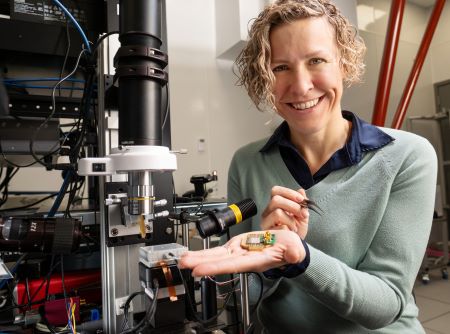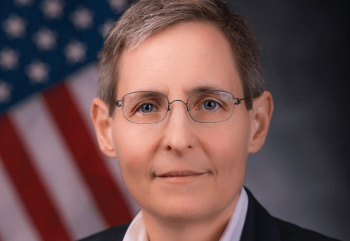Useful, commercial quantum computing systems expected within five years, experts say
Powerful, practical and highly accurate quantum computing systems are within five years of being commercialized and will usher in the start of the “quantum age,” say experts working in the field.
Academia, industry and government need to be planning how they will use the capabilities of quantum computers while also taking steps now to protect their data against quantum’s ability to crack existing computers’ encryption systems, they said during an Economist Impact panel session titled “Quantum readiness: preparing for the next era of innovation.”
 “What [quantum] will deliver is the next phase of human technology,” said Stephanie Simmons (photo at right), co-founder and chief quantum officer at Coquitlam, B.C.-based quantum computer firm Photonic Inc.
“What [quantum] will deliver is the next phase of human technology,” said Stephanie Simmons (photo at right), co-founder and chief quantum officer at Coquitlam, B.C.-based quantum computer firm Photonic Inc.
“Every time you commercialize a branch of physics it does eventually change everything.
We do know this is inevitable,” she said.
Quantum computing systems will offer exponential acceleration in finding solutions for key challenges that can’t be solved without quantum technology, Simmons said.
Quantum computing promises to revolutionize various fields by solving complex problems currently intractable for computers based on classical physics. These advancements could lead to breakthroughs in drug discovery, materials science, artificial intelligence, clean energy technologies and cybersecurity, among others.
Simmons said that within five years, there are going to be user applications on large-scale quantum systems using “logical,” or error-corrected, qubits “at a certain error rate that will deliver something useful.” A qubit is the basic unit of information used in quantum computing.
“It’s very clear right now that we are getting to the point where we’re commercializing quantum.
 We’re not quite there yet. [But] the breakthroughs are coming,” said Ann Dunkin (photo at right), former chief information officer for the U.S. Department of Energy who’s now a distinguished external fellow at Georgia Tech University’s Strategic Energy Institute.
We’re not quite there yet. [But] the breakthroughs are coming,” said Ann Dunkin (photo at right), former chief information officer for the U.S. Department of Energy who’s now a distinguished external fellow at Georgia Tech University’s Strategic Energy Institute.
Within five years, “We’re really going to start seeing some real meaningful scientific applications. We’ll start seeing people being able to use quantum to advance their research,” she said.
Quantum technology will help enable and speed up the global clean energy transition, whether it’s discovering new battery materials, novel substrates for solar panels, carbon capture technologies or bringing small modular reactors to market, Dunkin said.
Companies like Microsoft and others will have commercialized quantum systems that researchers, businesses and other organizations will be able to lease time on, she said.
It’s logical to assume, because of how other disruptive technologies (such as the internet, cloud computing and artificial intelligence) have developed, “that eventually it will come to a point where everybody can access quantum for certain activities,” Dunkin said.
 “I think in five years we’ll be talking about the ‘quantum age,’” said Zulfi Alam (photo at right), corporate vice-president at Microsoft Quantum.
“I think in five years we’ll be talking about the ‘quantum age,’” said Zulfi Alam (photo at right), corporate vice-president at Microsoft Quantum.
“This technology is going to change the entire product line. We are truly at an inflection point,” he said.
Microsoft has already run quantum algorithms on high-performance classical – not quantum – supercomputers, Alam noted. The company was able to quickly produce a new battery electrolyte material that was synthesized.
“What that effectively means is that the entire backend cycle – where you spend a year, two years in the materials industry or 10 years in the pharma industry – that can all be compressed dramatically once you have quantum machines that are powerful enough.”
Artificial intelligence – another disruptive technology – was just a dream only 10 years ago, Alam pointed out. The telephone evolved into the smartphone and changed people’s lives.
“Just like those technologies changed the course of humanity, quantum will do the same in the next few years,” he said.
Quantum offers both challenges and opportunities
The challenge to producing reliable, highly accurate, commercial quantum computing systems is getting enough high-performance quantum resources all working together, Simmons said.
But this is doable because essentially quantum is just a new branch of physics, she said.
“When people figured out how to build airplanes that started to get off the ground, it wasn’t to replace horses or cars at the time,” Simmons said.
Developing new physics means people get to do different things that aren’t possible to do any other way, she added.
For example, there’s currently no way to accurately model metal objects and catalysts using classical physics, Simmons noted. “It would take more bits than there are atoms in the universe for [scientists] to accurately model the full complicated electronic systems for certain chemicals.”
But with quantum computer systems, she said, “we will have tools fit for purpose [to model] physical objects, catalysts, things that change from one chemical to another.”
“It really is opening a whole new set of opportunities, some yet to be identified,” Simmons said.
Despite the power and promise of quantum, people won’t see handheld quantum machines or quantum laptops in the near future, Alam said.
Quantum systems aren’t standalone machines, he pointed out. Even a 1-million-qubit quantum machine will be part of a system that requires a classical supercomputer next to the quantum machine to control the qubits in it.
However, such quantum systems can be used to train AI models on highly precise data to make them hyper-accurate, compared with current AI models that can provide incorrect answers and even “hallucinate” bizarre responses.
“If we can make the underlying data much more precise, it changes the game on the AI side,” Alam said.
Quantum systems will exist alongside word processing software, the internet, AI and other technologies, he said. “You’ll have a quantum machine where some of the most complicated problems that cannot be solved otherwise will be solved.”
Dunkin pointed out that U.S. government investment in quantum has been critical in getting quantum to its current stage, “and will continue to be critical as commercialization comes, as people try and grow the capability.”
Quantum information science remains a stated priority area under the U.S. Department of Energy and the National Science Foundation.
The Trump administration’s proposed budget for fiscal year 2026 maintained funding for quantum research but provided no new investments or initiatives.
The proposed budget didn’t mention the National Quantum Initiative, the federal law that anchors U.S. quantum R&D strategy, and offered no new programs, growth plans or specific line items for workforce development or commercialization.
Canada, through its National Quantum Strategy launched in January 2023, committed $360 million over seven years to quantum research and commercialization.
In January this year, the federal government announced over $74 million (for 107 quantum projects) to advance quantum technologies in areas like quantum computing, communications, encryption, materials and sensing.
“If you’re [working] in the quantum space, it’s breakthrough after breakthrough every week.
It’s amazing how fast these things are moving,” Simmons said.
The federal government also announced in June, as part of Ottawa’s new strategic approach to defence and security, a new federal agency called BOREALIS (Bureau of Research, Engineering and Advanced Leadership in Innovation and Science). The aim of BOREALIS is to advance cutting-edge research in AI, quantum computing and other frontier technologies essential to safeguarding Canada’s sovereignty.
Quantum computers present a real data and cybersecurity risk
Quantum technologies offer many potential benefits but quantum computing systems also will present a real cybersecurity risk. Future quantum computers will be able to crack existing classical physics-based encryption systems now used to protect sensitive government, corporate and personal information.
“Quantum computing is going to be real and people are collecting data now in order to decrypt later,” Dunkin said. “It’s critically important for us to figure out, as people get quantum computers, how we’re going to defend against quantum.”
Both government and industry are paying increasing attention to developing post-quantum cryptography systems, she said. “There’s a lot of interest now in industry on how we protect from quantum computer attacks.”
Also, the National Institute of Standards and Technology (NIST), a U.S. federal agency, is developing new algorithms to defend encryption systems against quantum computers.
The Trump administration’s proposed budget includes a $325-million funding cut to NIST, which quantum industry leaders have warned could negatively impact the agency’s role in quantum research.
Alam pointed out that post-quantum cryptography capability is very good, at least at the level of data centres. However, the client-to-data centre component is “not there yet. Clients need to get on board,” he said.
 Panel moderator Steve Suarez (photo at right), founder and CEO of HorizonX Consulting and co-founder of the Quantum Innovation Index, said businesses and other organizations should start getting post-quantum cryptography certification now.
Panel moderator Steve Suarez (photo at right), founder and CEO of HorizonX Consulting and co-founder of the Quantum Innovation Index, said businesses and other organizations should start getting post-quantum cryptography certification now.
Dunkin agreed, saying that “every supplier, every software vendor has to implement post-quantum encryption algorithms.”
There are a lot of applications where the security component isn’t modular, she noted. Organizations are going to have to figure out how to make that piece a modular component, pull out their existing security algorithms and put in new quantum-safe algorithms, she added.
For example, there are at at least 20 billion Internet-of-Things devices that have security algorithms that will need to be updated.
“Every security algorithm needs to be updated. Some companies are paying attention to that and some are not,” Dunkin said.
Moving to software applications and computer systems that are protected against quantum computing attacks is going to be “a very expensive endeavour” across industry, she noted.
The U.S. Department of Energy looked at the cost of updating algorithms and estimated it would cost $1 billion just for that one department, Dunkin said.
“Absolutely everybody should be adopting new cryptographic standards, changing the software,” Simmons said. “The best thing to do is just get to PQC [post-quantum cryptography] today.”
However, once academia, government, industry and other sectors make that transition, “then it’s only a technological upside in terms of what [quantum] can offer,” she said.
Simmons said that upside includes the possibility of using interconnected quantum networks and tapping the property of quantum entanglement to teleport information to various locations and build different quantum-based positioning, navigation and timing technologies.
Such technologies offer significant improvements over classical systems by providing enhanced accuracy, resilience and operation in challenging environments.
AI and quantum can reinforce and accelerate each other
AI and quantum are both disruptive technologies that can be used to accelerate each other, the panellists said.
“Where there is a fit, the combination of the two of them will be greater,” Dunkin said. “Using both quantum and AI to solve a problem is going to get you further than using just one [of the technologies].”
Simmons noted that AI is already helping industry and other sectors. Quantum will help AI by providing much more accurate data sets for training AI models, she said.
“[We] want to think about taking these tools and then using that to feed into better models and use that to navigate the future,” Simmons said.
Microsoft’s position is that both AI and quantum reinforce each other dramatically, Alam said. “You need the best-of-the-line models to train AI and quantum gets you the highly accurate [models], the best model that you can get,” he said.
Also, AI is helping quantum because most of the challenges with quantum are on the hardware side and require solutions that aren’t easy to find, he added.
“You could spend five years experimenting or you could work with your AI and zoom in on the preferred area of interest quickly and use that as a starting point,” which Microsoft is doing, Alam said.
Panel moderator Suarez asked the quantum experts whether they’d encourage young people to get into the quantum field and what skills are needed.
“I would strongly urge young people to come to quantum because this is the new frontier,” Alam said.
Mathematics is a must for quantum, “because all these algorithms we’re talking about require math,” he said. “If you are good in math you will be able to function in a quantum economy flawlessly.”
AI is already taking some of the workload off software developers, doctors, lawyers and other professionals, Alam said. With quantum, he added, “I suspect the world is going to require mathematicians more so than it ever did.”
Dunkin agreed that young people can’t go wrong by studying math and engineering. “The fundamental science and engineering skills are what’s going to enable people to not only succeed in quantum, but [in] what’s next.”
However, computer science and IT skills are much more transitory and will be changing very rapidly, she said. “AI is [already] taking a chunk out of a lot of those roles.”
Simmons said the quantum field is a frontier space that will require a new set of different skills, both technical and non-technical.
It’s important to have “this ability to always shift into ‘the next [thing]’ and be very well-versed in one language as well as another,” she said. “You can start to recognize patterns across multiple disciplines and accelerate things.”
Simmons noted that electricity isn’t well understood by most people, but we don’t consider it magic when we plug an appliance into a wall socket.
So her message to young people considering a career in quantum is: “Don’t worry. Come on in. Have some fun. Learn a lot. Let’s push this frontier together.”
R$
Events For Leaders in
Science, Tech, Innovation, and Policy
Discuss and learn from those in the know at our virtual and in-person events.
See Upcoming Events
You have 0 free articles remaining.
Don't miss out - start your free trial today.
Start your FREE trial Already a member? Log in
By using this website, you agree to our use of cookies. We use cookies to provide you with a great experience and to help our website run effectively in accordance with our Privacy Policy and Terms of Service.




